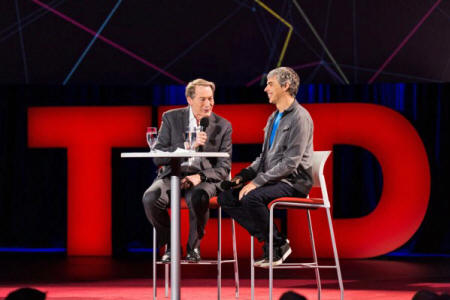Larry Page, chief executive officer of Google Inc.
told an audience at a TED Q&A session with
Charlie Rose that,
"the NSA's far-reaching data collection
regime a threat to democracy and an obstacle to technological
innovation."
Page said:
"For me, it's tremendously disappointing
that the government sort of secretly did all these things and didn't
tell us.
I don't think we can have a democracy if we're having to
protect you and our users from the government for stuff that we
never had a conversation about."
The Google executive explained that his corporation,
"is open to the
argument that national security
requires the NSA and other agencies need
to do some level of electronic eavesdropping - but determining the
limits of that eavesdropping needs to happen in public if it's going
to have the public's blessing."
Page asserted:
"We need to know the parameters of what
the government is doing and why.
The government actually did itself
a tremendous disservice by doing all that in secret. I think we need
to have a debate about it or we can't have a functioning democracy.
It's not possible."
However, Page noted that there is,
"a risk that, by feeding privacy
paranoia, the NSA is deterring individuals from sharing personal
information in ways that could actually benefit them. I'm just very
worried that with internet privacy, we're doing the same thing we're
doing with medical records - throwing out the baby with the
bathwater.
We're not thinking about the tremendous
good that can come from sharing the right information in the right
ways."
Later, it was
tweeted that Page said:
"Wouldn't it be amazing if everyone's
medical records were available anonymously to research doctors.
Would save 100k lives/yr."
This rhetoric makes sense, considering that
Google is invested in making sure the whole world is online.
Last year, Google's
Project Link (PL)
announced plans to build,
"fiber-optic networks, making it
possible for local providers to connect more people to the Internet
and each other."
To attain the goal of creating a,
"faster, more reliable internet" PL
is seeking to construct "fiber-optic networks" that "enables internet
service providers (ISPs) and mobile operators to provide faster
connections."
Google is a member of the Alliance for
Affordable Internet (A4AI) that endeavors to,
"see the UN Broadband Commission
Broadband Target of entry-level broadband services priced at less
than 5% of average monthly income realized."
According to Pew Research Global Attitudes Project (PRGAP), there is
a growing palatable,
"opposition to internet censorship in
emerging and developing nations."
Where more citizens are online, there is more
"support for internet
freedom" which is facilitated by younger generations who "consider
internet freedom a priority."
Those nations that want uncensored internet access include:
-
Venezuela
-
Lebanon
-
Chile
-
Egypt
-
Brazil
-
Mexico
-
South Africa
The scheme behind the expansion of the internet under private
corporate control may have begun at a dinner/fundraiser in Silicon
Valley for the Obama administration's second run (2011) for president.
Attendees at this event were:
Guests spent $35,800 a plate, with $5000 diverted to Obama's
re-election campaign fund and the remainder funneled to the Democratic
National Committee (DNC).
To further the dream of a
government controlled
internet, Obama introduced a $3.7 trillion
budget to Congress which included,
"$148 billion for research and
development" and "$80 billion for federal information technology
programs."
This money was funneled directly to Silicon Valley giants for
research and development, computer training and supplies.

